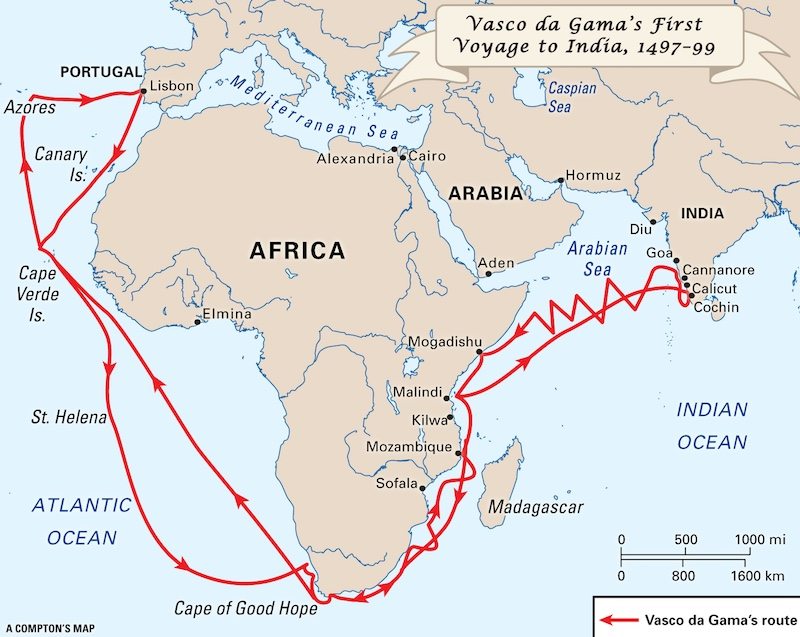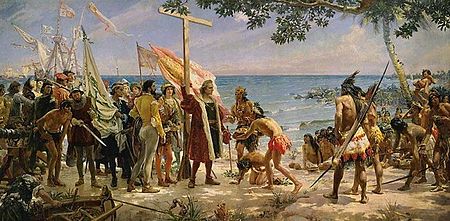Isabela Padilha
C
Christine Lin
AP European History 🇪🇺
335 resourcesSee Units
Factors That Aided European Exploration & Expansion
The major factor that prompted European exploration was the advancement of technology in navigation, cartography🗺, and military technology💣. This included the creation of devices such as the compass, sternpost rudder, and the advancement of guns. In terms of weaponry, the technological advancements consisted of guns and gunpowder. The discovery of the Americas expanded European horizons both intellectually and geographically. Portugal and Spain led the Age of Exploration with Spain having the longest lasting impression on the New World.
Portugal’s 🇵🇹 main reason for exploration🌍 was to find a quicker route to Asia in search of spices. They were also in search of slaves, gold, and wanted to launch missionary efforts in order to “save” the Muslims. Prince Henry the Navigator captured the north African Muslim city of Ceuta and searched for a safe route around the tip of Africa to Asia’s spice market. Portugal eventually became one of the leaders in the slave trade, as their ships delivered over 150,000 slaves to Europe by the end of the 15th century.
Another Portuguese explorer, Vasco da Gama, sailed all the way to India around the tip of Africa and returned with spices worth almost 60 times as much as the cost of his voyage. The Portuguese colonies of Calcutta and Goa off the coast of India also came about during this time.

Image Courtesy of Highbrow
While Portugal concentrated on finding a route east to India, Spain focused on a route travelling west across the Atlantic. Spain had Christopher Columbus travel to what he thought was Japan and China. It was not until his third trip that he realized that he was not in Asia, he actually thought he had landed in the East Indies.
His mistake led to the Taino Indians in South America being referred to as Indians across Europe. After Columbus, Amerigo Vespucci and Ferdinand Magellan explored the coastline of South America with Magellan sailing around the tip of South Africa and landing in the Philippines where he was eventually killed. Spain began conquests as well as missionary efforts in South America which left an imprint of Roman Catholicism and economic dependency which can still be seen today.

Image Courtesy of Wikipedia - The arrival of Columbus in the Americas
Political Economy and the exploration
As mentioned before, nations were engaging in exploration because it provided them with the chance of enriching themselves through access to gold, spices and other goods considered to be luxury in that time period. But, it is important to understand the economic theories of that era to fully analyze the motivations of these European nations.
In this era, the mercantilist ideology was highly predominant, and defined the way nations developed their economies. Theorists, such as the French Jean-Baptiste Colbert promoted mercantilist ideas that had as its final goal to acumulate power and wealth. This could be done by having a favorable balance of trades (export more than import) and having access to raw materials that would make the country more self-sufficient.
The Effects of European exploration and expansion
1. European states wanted access to more gold, spices, and luxury goods to enhance personal wealth and power.
2. Growing idea of mercantilism that promoted states in commercial development and acquisition of overseas colonies.
3. Spread of Christianity by both the government and religious authorities to justify the abusive treatment towards the indigenous civilizations.
4. Enlightenment philosophers compared Columbus’ discovery to the invention of the printing press in terms of how historic these events were.
Browse Study Guides By Unit
🎨Unit 1 – Renaissance & Exploration
⛪️Unit 2 – Reformation
👑Unit 3 – Absolutism & Constitutionalism
🤔Unit 4 – Scientific, Philosophical, & Political Developments
🥖Unit 5 – Conflict, Crisis, & Reaction in the Late 18th Century
🚂Unit 6 – Industrialization & Its Effects
✊Unit 7 – 19th Century Perspectives & Political Developments
💣Unit 8 – 20th Century Global Conflicts
🥶Unit 9 – Cold War & Contemporary Europe
📚Study Tools
🤔Exam Skills
👉Subject Guides

Fiveable
Resources
© 2025 Fiveable Inc. All rights reserved.